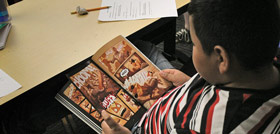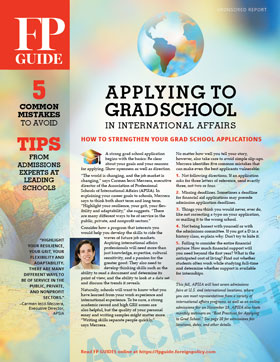2017 Applying to Grad School
THIS GUIDE IS NO LONGER ACTIVE. For the current FP Guide, click here.
 A strong grad school application begins with the basics: Be clear about your goals and your reasons for applying. Show openness as well as direction.
A strong grad school application begins with the basics: Be clear about your goals and your reasons for applying. Show openness as well as direction.
“The world is changing, and the job market is changing,” says Carmen Iezzi Mezzera, executive director of the Association of Professional Schools of International Affairs (APSIA). In explaining your career goals to schools, Mezzera says to think both short term and long term. “Highlight your resilience, your grit, your flexibility and adaptability,” she suggests. “There are many different ways to be of service in the public, private, and nonprofit sectors.”
Consider how a program that interests you would help you develop the skills to ride the waves of future job markets. Aspiring international affairs professionals will need more than just knowledge, expertise, cultural sensitivity, and a passion for the greater good: They also need to develop thinking skills such as the ability to read a document and determine its point of view, and the ability to look at a data set and discuss the trends it reveals.

“Highlight your resilience, your grit, your flexibility and adaptability. There are many different ways to be of service in the public, private, and nonprofit sectors.” –Carmen Iezzi Mezzera, Executive Director, APSIA
Naturally, schools will want to know what you have learned from your work experience and international experience. To be sure, a strong academic record and high GRE scores are also helpful, but the quality of your personal essay and writing samples might matter more. “Writing skills separate people quickly,” says Mezzera.
No matter how well you tell your story, however, also take care to avoid simple slip-ups. Mezzera identifies five common mistakes that can make even the best applicants vulnerable:
1. Not following directions. If an application asks for three letters of reference, send exactly three, not two or four.
2. Missing deadlines. Sometimes a deadline for financial aid applications may precede admission application deadlines.
3. Things you think you would never, ever do, like not correcting a typo on your application, or mailing it to the wrong school.
4. Not being honest with yourself or with the admissions committee. If you got a D in a history class, explain why. Don’t try to hide it.
5. Failing to consider the entire financial picture: How much financial support will you need beyond the first year? What is the anticipated cost of living? Find out whether students often work while studying full-time and determine whether support is availablefor internships.
This fall, APSIA will host seven admissions fairs at U.S. and international locations, where you can meet representatives from a variety of international affairs programs, as well as an online admissions fair on November 15. APSIA also hosts monthly webinars on “Best Practices for Applying to Grad School.” Click here for admissions fair locations, dates, and other details.
Contents
- 2017 Applying to Grad School
- Association of Professional Schools of International Affairs (APSIA)
- Georgetown University, Walsh School of Foreign Service (SFS)
- University of Denver, Josef Korbel School of International Studies
- American University, School of International Service (SIS)
- Johns Hopkins University, School of Advanced International Studies (SAIS)
- Middlebury Institute of International Studies at Monterey
- University of Washington, The Henry M. Jackson School of International Studies
Visit the Request Info page to receive information from the schools

